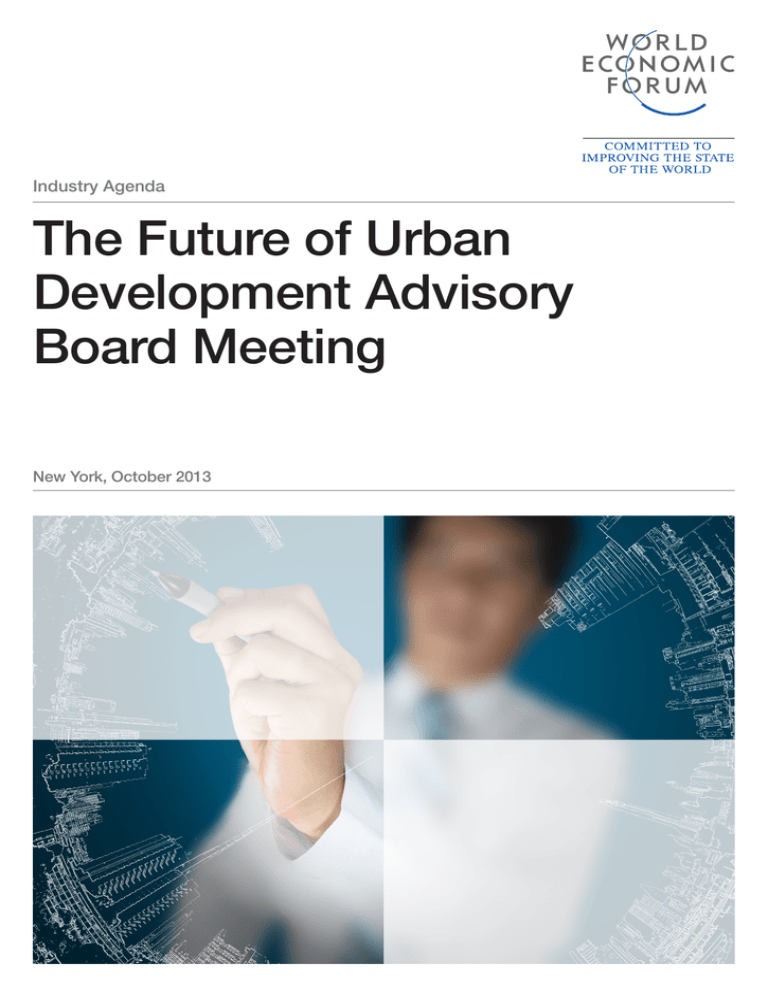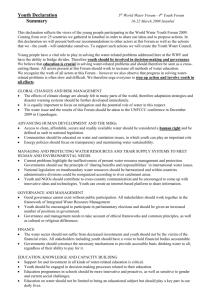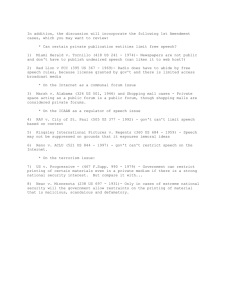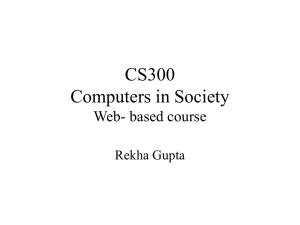
Industry Agenda
The Future of Urban
Development Advisory
Board Meeting
New York, October 2013
© World Economic Forum
2013 - All rights reserved.
The views expressed are those of various participants in the discussion and do not necessarily reflect the views of all participants, the
organizations with which they are affiliated, or of the World Economic Forum.
REF 161013
Session Summary
The Future of Urban Development Advisory Board Meeting
Industry Partnership Strategy Meeting – New York
Wednesday 2 October 12.00 – 14.00
New York City, USA
Executive Summary
In this session, Advisory Board members were in favour of
the Forum continuing with the Champion City activity that
goes deep into regions. Members were also keen on the
Future of Urban Development Initiative maintaining a broader
dialogue between its communities as the Forum’s leadership
network in general.
Synopsis
The Future of Urban Development Initiative serves as a
partner in transformation for cities worldwide as they address
significant urban challenges. It aims to make innovation
accessible to city leaders and businesses in a mutually
beneficial setting.
Eighteen months after the launch of the Initiative, Advisory
Board members convened to discuss the Initiative’s direction
– whether to continue with the current suite of activities
that fall under the Initiative’s broad umbrella, or to explore
alternative directions to maximize impact.
The current trajectory: These following four activities define
the Initiative.
– Champion City Activity: Board members of the Initiative
test a new model for urban problem-solving by working
with leaders of select cities to address specific challenges
and catalyse action. In its initial phase, the activity has
focused on working with Chinese cities, beginning with
Tianjin. After early indicators of success, the activity is
working with Dalian and Zhangjiakou in 2013-2014. The
plan is to extend the activity to India in 2014 and then to
other regions.
– Urban Anthologies: Learning from Cities: The Global
Agenda Council on Urbanization generates insights on
strategies to address urbanization and publishes them
once a year in a creatively formatted publication that is
circulated to urban leaders worldwide.
– Competitive Cities: The Global Agenda Council on
Competitiveness is in the early stages of integrating cites
into the Forum’s annual Competitiveness Report.
– Toolbox for Urban Governance: The Council on
Governance is developing scenarios for governance in
2050, one of which describes cities playing a leading role
in global developments.
BRAINSTORMING FUTURE DIRECTIONS FOR THE
INITIATIVE
Key takeaway: Continue with the Champion City activity
Based on its pilot phase, the Champion City activity
has proved successful in offering Chinese cities tailored
recommendations to tackle common urban challenges, and
in creating partnerships between Champion Cities and Board
Members to help implement those solutions. However, the
activity has also turned out to be time and resource-intensive
in achieving the stated goal of “catalysing action”. Working
with each city takes over a year and requires almost all of
the Initiative’s staff capacity, which makes expanding to new
regions a challenge.
Before replicating the activity with additional cities,
participants debated whether to continue as is or modify the
approach.
– All the participants were keen on further developing the
Champion City model as it presents a rare opportunity of
urban problem-solving that is particular to an institution
such as the World Economic Forum. The value of the
Initiative is indeed to take those regional deep-dives and
scale them up to a more global dialogue.
– In addition, the Initiative could look at conditions where it
can head off but also reconsider the level of involvement
in the implementation of the Champion City model.
– The participants were also greatly interested in moving
the activity to other regions and to test the models in
myriad contexts. Some participants were proposing
“messier cities” (sic) where there is a greater challenge in
dealing with local governance.
– It was also suggested to transport the activity to new
and rising cities, in particular cities in sub-Saharan
Africa where hasty urbanization, coupled with an even
faster population growth, is paralleled with a lack of
infrastructure and poor governance.
– A few participants suggested that the Initiative takes on
less challenging cities (cities of developed countries), or
large-scale development projects rather than whole cities.
The activity will be not be as resource-heavy as before
and the Initiative could take those success stories and
move the model faster across geographies.
– Another trend of recommendations suggested that the
Initiative create demand for solutions rather than being
a “hammer in search of a nail”. The Initiative could then
match regions of need to the capabilities of the Forum in
order to intervene and propose solutions.
The Future of Urban Development Advisory Board Meeting
3
Key takeaway: Develop a broader global dialogue in
parallel to the Champion City activity
01
Participants generally agreed that the Forum should pursue a
broader, high-level global dialogue to complement the deepdive approach of the Champion City activity. The following
topics were suggested:
– Smart cities: Topics on governance and “smart cities”
were the most favoured. It seems natural to the Initiative
to engage in dialogues on governance, since this is
exactly what the Forum as a whole engages in. However,
complex topics such as governance and smart cities
need to be “unbundled”, according to some of the
participants, so that the Initiative and stakeholders can
make sense of them.
02
– Citizen engagement: As a common subtheme of
governance and smart cities, this topic was elaborated
differently between participants. Some talked about the
democratization of the planning process and whether
planners can make sense and can handle the amounts
of data they receive daily; while others mentioned the
inclusion of urban poor in global debates.
– Lifting up bottom issues: The Initiative should bring
back more humane and social issues, such as sewage
treatment, food waste and food security, whose solutions
will be transformative. Additionally, there should definitely
be more emphasis on working on urban resilience and
the impact of urbanization on the environment.
03
–Environment/climate: Based on the comment on
environmental issues and their solutions, and whether
they have a place in the future of the Initiative, the
session concluded with a brief intervention from Dominic
Waughray, Senior Director of the Environmental Activities
at the World Economic Forum. Waughray shed light on
future Forum projects in collaboration with the United
Nations Framework Convention for Climate Change. The
two organizations will collaborate on a new environmental
global deal in which the topic of cities and urbanization
will play a central role.
04
4
The Future of Urban Development Advisory Board Meeting
01: Michael Lightfoot,
Head of Public Affairs,
Akzo Nobel NV,
Netherlands (centre);
Kiyoaki Sugiyama,
Executive Officer, Kokusai
Kogyo, Japan (left); Jit
Bajpai, Independent
Consultant and Adjunct
Professor, the Earth
Institute and Columbia
University
02: Kiyoaki Sugiyama,
Executive Officer, Kokusai
Kogyo, Japan (centre);
Christopher Thomas,
Founding Principal,
Fontinalis Partners,
USA (left); Michael
Lightfoot, Head of Public
Affairs, Akzo Nobel NV,
Netherlands
03: John Casesa, Senior
Managing Director,
Investment Banking,
Guggenheim Partners,
USA
04: Participants of the
session The Future of
Urban Development
Advisory Board Meeting,
Industry Partnership
Strategy Meeting, New
York, Wednesday 2
October
01
03
02
04
01: John Brodhead,
Executive Director
CityWorks, Evergreen
Brick Works, Canada
(left); Mary Stromitis,
Senior Manager, Strategic
Marketing, Qualcomm,
USA
02: Pooran Desai, Cofounder, BioRegional
Development Group,
United Kingdom
03: Eugenie L. Birch,
Nussdorf Professor and
Co-Director, Penn Institute
for Urban Research,
University of Pennsylvania,
USA
04: Alfredo Brillembourg,
Professor at ETH Zurich,
Adjunct Professor of
Architecture at Columbia
University, Founder,
Urban Think tank, Zurich,
Switzerland
05: Moderating the
session: Robin Ried,
Associate Director,
Infrastructure and Urban
Development Industry,
World Economic Forum,
USA (left); Muriel Skaf,
Intern, Future of Urban
Development Initiative,
World Economic Forum,
USA (right)
05
The Future of Urban Development Advisory Board Meeting
5
PARTICIPANTS
Industry Partners
– Christopher Thomas, Founding Principal, Fontinalis
Partners, USA
– Kiyoaki Sugiyama, Executive Officer, Kokusai Kogyo,
Japan
– John Casesa, Senior Managing Director, Investment
Banking, Guggenheim Partners, USA
– Mary Stromitis, Senior Manager, Strategic Marketing,
Qualcomm, USA
– Stefan Denig, Vice-President, Center of Competence
Cities, Siemens, United Kingdom
– Jennifer Latka, Director, Corporate Strategy and
Development, United Technologies Corporation, USA
Industry guest
– Michael Lightfoot, Head of Public Affairs, Akzo Nobel NV,
Netherlands
Experts
– Pooran Desai, Co-founder, BioRegional Development
Group, United Kingdom
– Alfredo Brillembourg, Professor at ETH Zurich, Adjunct
Professor of Architecture at Columbia University, Founder,
Urban Think tank, Zurich, Switzerland
– John Brodhead, Executive Director CityWorks, Evergreen
Brick Works, Canada
– Anthony Townsend, Senior Research Fellow, Rudin
Center for Transportation, New York University, USA
– Jit Bajpai, Independent Consultant and Adjunct Professor,
the Earth Institute and Columbia University, USA
– Susan Wachter, Richard B. Worley Professor of Financial
Management and Professor of Real Estate, Finance
and City and Regional Planning, The Wharton School,
University of Pennsylvania, USA
– Eugenie L. Birch, Nussdorf Professor and Co-Director,
Penn Institute for Urban Research, University of
Pennsylvania, USA
From the World Economic Forum
– Alex Wong, Senior Director, Head of Business
Engagement and Head of Basics & Infrastructure
Industries, World Economic Forum, Switzerland
– Robin Ried, Associate Director, Infrastructure and Urban
Development Industry, World Economic Forum, USA
– Michael Buehler, Associate Director, Head of Real Estate,
World Economic Forum, Switzerland
– Muriel Skaf, Intern, Future of Urban Development
Initiative, World Economic Forum, USA
6
The Future of Urban Development Advisory Board Meeting
The World Economic Forum
is an independent international
organization committed to
improving the state of the world
by engaging business, political,
academic and other leaders of
society to shape global, regional
and industry agendas.
Incorporated as a not-for-profit
foundation in 1971 and
headquartered in Geneva,
Switzerland, the Forum is
tied to no political, partisan
or national interests.
World Economic Forum
91–93 route de la Capite
CH-1223 Cologny/Geneva
Switzerland
Tel.: +41 (0) 22 869 1212
Fax: +41 (0) 22 786 2744
contact@weforum.org
www.weforum.org







